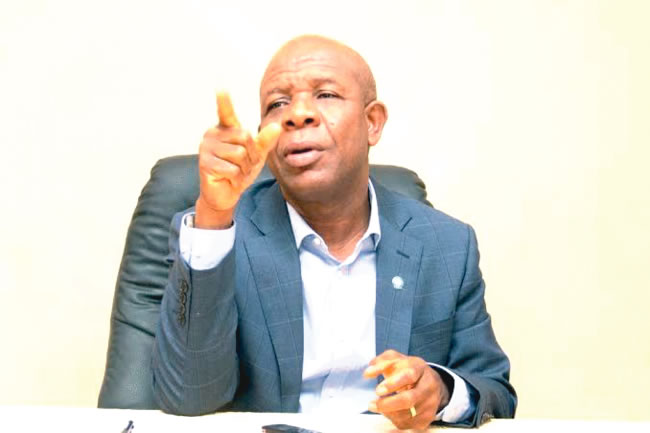In this interview with AKIN ADEWAKUN, the immediate past president, National Institute of Marketing of Nigeria (NIMN), Tony Agenmonmen, bares his mind on an array of marketing issues, including the forthcoming Nigerian Marketing Awards, and the need for marketers to be adaptive to survive today’s increasingly challenging economic space. Excepts:
WHAT should marketing practitioners be doing at this time when the nation’s economy is going through trying times?
Unfortunately, I may have to disappoint you because there is no direct prescription as to what they should be doing. What they should be doing now is, of course, what any seasoned marketing person should do at any time, because from the start of time, we’ve always had turbulence. The turbulence can be minor and it can be major. So, any marketing person that knows his onions should know that today, or tomorrow is always a new day. So obviously, what any seasoned marketing practitioner needs at this time is to be adaptive. You have to adapt to the environment. Talking about difficulties in the environment, yes of course, things are difficult. Things are tight. There is no much money, so the marketing person, therefore, must also be creative. Those days consumers picked products without the necessary critique are gone. That means before you introduce any product into the market, you have to empathise with the consumers. You have to be in their shoes. You have to look at their pain-points. You have to think of how your brand can be a solution to such pain-points. At the end of the day, yes brands must make profit, but within that context of making profit, it must also look at how it can support its consumers.
Some marketers are gradually seeing the social media as huge distractions and a disservice to their brands because of the ‘noise’ that oozes out from there, being an unguarded space. How should marketing practitioners handle such ‘noise’?
One thing is this: reality is reality. It can’t be changed. So every marketing person must operate within that context. A lot of things are said there. Some correct, some false. I think at the end of the day, the fundamentals of the brand remain. The most important thing is that your brand should live up to its promise. If your brand is not living up to its promise, of course, you are going to be hammered. Those days of customers physically coming to your office to complain, and you, taking your time to respond, are gone. What it simply means is that you have to be structured to be able to monitor what is happening because the truth is, no matter how hard you try, a few things can go wrong. Yes, the social media phenomenon is there, but we have to live with it. We have to manage it.
Looking back today, will you say you were able to achieve some of those targets you set for yourself when you were president of the National Institute of Marketing of Nigeria (NIMN), for instance, ridding the space of quacks?
For me, leadership is a journey, it’s not a destination. The state at which we met the institute then was completely different. We didn’t have reputation, respect and so on. And I’m sure many people didn’t want to be identified with it. Everybody now is proud to say I’m a fellow, I’m a member, which is exactly what we wanted. So for me that is progress. But are we there yet? No. There is still a lot of work to be done, as an institute and the whole of the marketing communication space in terms of making sure that all those who practise marketing are actually under the control of the institute, so that they can be properly monitored to ensure that they are keeping to the tenets of the profession of marketing. But have we made progress? Yes, and I’m proud of the progress that have been made.
The Nigerian Marketing Awards is almost here, what is the level of preparations like?
We are already there. We are talking of an event happening in November, this year. It’s tough, because the environment is tough, but we are doing the best that we can to ensure that we keep the quality standards we started with. We want to prove wrong those that imagined that the maiden edition was a flash in the pan. We are going to improve on what they saw last year. So, in a situation like this, we look at our operations, once it’s concluded, we look at the highpoints, look at the low points, and then try to improve on the low points.
Learnt that there is a 37 percent increase in the number of entries, this year, compared to what we had last year. Can we have an idea of the categories witnessing such surge?
I don’t think the judges will allow me to divulge this. They are in the position to say that at the end of the day. All I know is that last year, we had about 106 entries and this year, we are having about 145. I think that’s about 37 percent improvement on the total number of entries. But in terms of quality, we’ll still do the analysis and the judges will present their report when they are done. But I’m fully impressed that from the humble beginning last year, the brand is getting to have roots, and I think people are getting to understand it. It’s a new style, a new method.
You went the extra mile of getting accreditations, both local and global, for the award last year. How much of that did you do this year?
Talking about the foreign accreditation body, you know last year we were just starting and they wanted to see how the first edition would go. Based on what we did, we were confident that we had ticked all the boxes of quality, and that qualified us to move to the next stage, because they have three levels of accreditation. What we had last year was the bronze level, but this year we applied for the next level, and we scaled through it easily. The process is simple. When I say simple, I mean straightforward, open and transparent. We promised we would run the award in a certain way, they not only follow us, they follow the media, they check the website, they check what we are doing to be sure that it aligns with the promise. I’m happy to say that we have moved up to the next level of accreditation. We are still retaining the quality of judges, the only thing we have done is to boost the number by injecting three more people, and of course, because of what happened, we now have a new chairperson of the committee. In terms of quality of the panel, it hasn’t changed. We actually expect them to build on the experience of last year, to deliver the highest quality of adjudication. There a few things that will be different on that day.
READ ALSO FROM NIGERIAN TRIBUNE
WATCH TOP VIDEOS FROM NIGERIAN TRIBUNE TV
- Relationship Hangout: Public vs Private Proposals – Which Truly Wins in Love?
- “No” Is a Complete Sentence: Why You Should Stop Feeling Guilty
- Relationship Hangout: Friendship Talk 2025 – How to Be a Good Friend & Big Questions on Friendship
- Police Overpower Armed Robbers in Ibadan After Fierce Struggle






